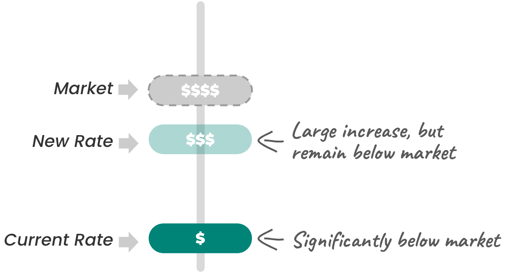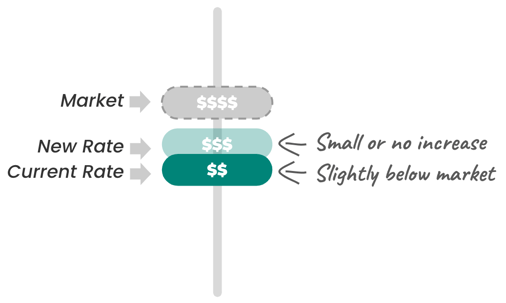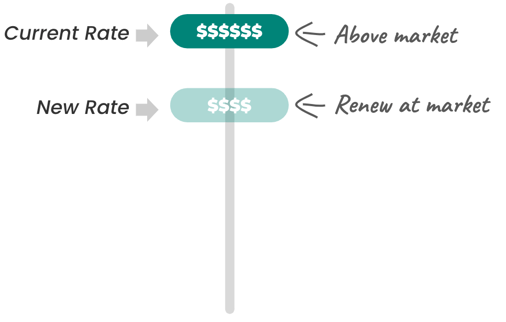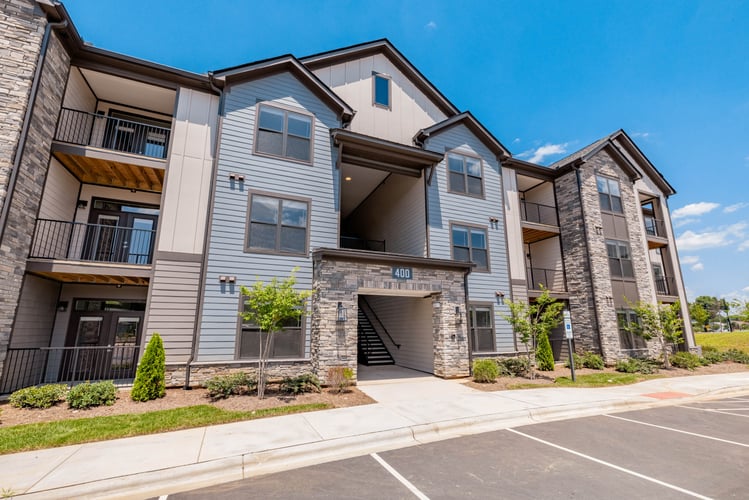Are you looking for ways to make your apartment community more efficient and effective? This is Part 2 of our Apartment Vacancy Analysis series, which will help you find and fix the gaps across the marketing and leasing chain, and offers practical strategies and tools to help take your apartment community to the next level! Access the full table of contents available below.
🤕 Problems & symptoms of a weak lease renewal strategy
You don't have a renewals system or strategy.
The first line of defense in combating vacancies is having a robust strategy for pricing, delivering, and winning more lease renewals.
With one, it's easier to keep the tenants who want to stay and, more importantly, persuade others away from moving to another community when their current lease expires.
Not having a good strategy for dealing with renewals inevitably produces more unnecessary vacancies, creating a bigger problem.
Your community's turnover rate is higher than industry benchmarks.
Every apartment community experiences some vacancy resulting from turnover—even if you're pre-leasing units.
We studied turnover rates across roughly 200,000 units in 2023 and found that Class A communities typically experience more turnover each year than others.
Benchmarks for turnover by property class:
- Class A: 44.9%
- Class B: 40.4%
- Class C: 32.2%
If your community's annual turnover rate is higher than the industry benchmark for its property class, you could have an issue.
The primary cause at this stage of the resident lifecycle is that residents don't understand the price in your renewal offers—we'll diagnose what that means next.
But, of course, the other significant factor is how residents felt treated while living at your apartment community that determines whether or not they would want to renew. We'll discuss that in the next blog.
🤦🏼♂️ Common mistakes multifamily operators make with their renewals
You're raising renewal rates too aggressively.
We understand that market-rate rents can change over the course of a current resident's lease, but your residents may not understand these market conditions or pay attention to them the way we do, so you have to be careful.
Say the market rate is higher than the current rate they're paying at the time of renewal. In this instance, increasing the renewal rate is warranted.
But aggressively raising renewal rates, even if the market has gone up, will undoubtedly turn off existing residents who want to feel some incentive to continue to live in your apartments.
You never want your renewal pricing to exceed what you charge someone for a new lease.
You're not raising renewal rates enough.
Simultaneously, suppose the market has increased from the resident's current rate at the time of renewal, and you decide to offer a renewal price at or only slightly above their current rate.
In that case, you're sacrificing your community's revenue performance to prevent turnover.
You never offer a lower renewal rate when appropriate.
Then, there are also instances where the market rate has fallen below the resident's current rate.
When true, renters have the upper hand because they can live in any other apartment community for a better price than they currently pay.
If you don't offer a competitive renewal rate that is less than their current rate in this situation, then the chance of renewing that resident is pretty much zero, and vacancy multiplies.
You send renewal offers too late in the process.
You probably require your renters to give notice within a particular time period—but do you hold yourself to the same standard when it comes to setting and delivering a renewal offer beforehand?
If you're sending renewal offers after your notice period or within a few weeks of when a lease expires, you're lowering the chance that the resident stays. By that point, they're already well down the path toward moving out and it'll be harder for them to change their decision.
🙌🏼 Best practices for lease renewal offers
When the market rate increases, increase renewal pricing but remain below market.

Sometimes, renewing tenants must pay higher than their current rate when the market has increased significantly. (Of course, they'd also have to pay a higher rate anyway if they're renewing on terms shorter than a year.)
But you can still make it easier for them to stay by offering a renewal rate slightly less than the price of a new lease.
When current rent is slightly below the market, offer a small rental increase (or no increase at all).

In this circumstance, slightly bumping up the price closer to the market rate at the time of renewal than what the resident currently pays is still warranted. Or you could also choose to renew at the same rate.
Either way, you're protecting your community's revenue and treating the residents fairly.
If the resident is paying above market rate, offer a lower price in your renewal.

For years, the natural stance of multifamily operators was never to offer a renewal price below what a current resident is paying—which is simply wrong.
You must renew residents at the market rate when it's less than their current rate.
Not doing so will, of course, eliminate any chance they stay, and worse, you're going to leave a terrible impression of your community to them, and they'll let your future residents hear about that in a negative online review.
🛠 Tools to help improve your apartment's renewal strategy
Develop a system for lease renewals.
When you have a system for lease renewals, three things happen:
- You deliver renewal offers with pricing intent before your notice period.
- Every resident gets the same treatment.
- It becomes easier to decrease turnover.
Get a revenue management solution that offers renewal pricing.
RentVision Revenue Management makes renewals easy by automating renewal prices by any term length for every lease using your community's unique supply and demand factors.
That means your renewal pricing helps maximize your revenue while also minimizing turnover. Plus, we provide customizable renewal letter templates that will help you create and deliver offers in minutes and on time.
Read our renewal strategy guide.
There's much more to establishing an effective lease renewal strategy than just good pricing practices. You also need to be thoughtful about the lease terms you offer. For more information, read RentVision's guide to lease renewals for multifamily.
➡️ Next page: Are your residents satisfied with their experience at your apartments?
Complete Apartment Vacancy Analysis Series
Introduction: What's causing your apartment's vacancy? Here's how to find & fix it
Part 2: Is your apartment's renewals strategy causing more vacancy?
Part 3: Are your residents satisfied with their experience at your apartments?
Part 4: Are you accruing excess vacancy loss after units lease?
Part 5: Are you properly vetting your apartment's lease applications?
Part 6: Is your apartment's application process to blame for vacancies?
Part 7: Are your apartment tours helping overcome vacancy?
Part 8: Do you have enough 'good' leads to improve apartment leasing?
Part 9: Is your apartment website converting leads to leases?
Part 10: How qualified is the traffic to your apartment website?
Part 11: What about pricing?! How rents affect your apartment's performance

